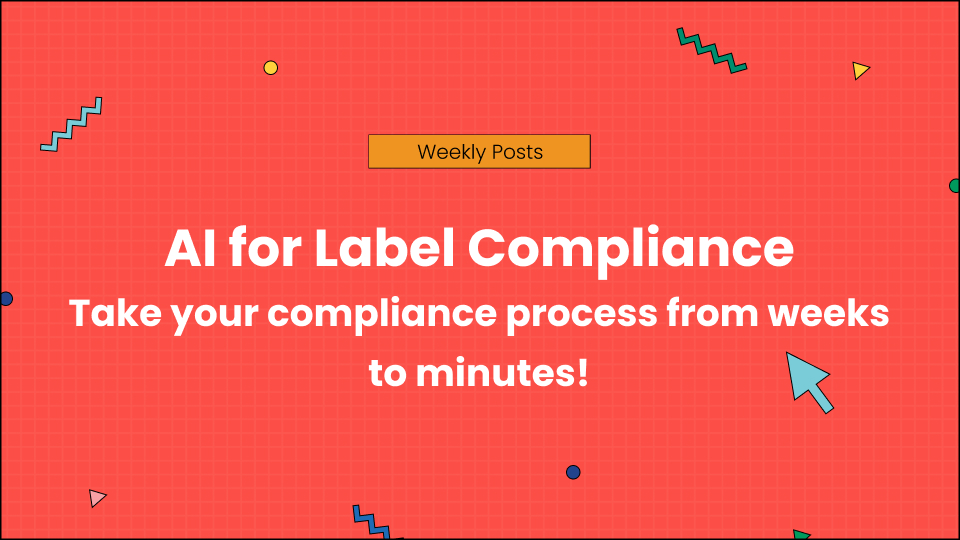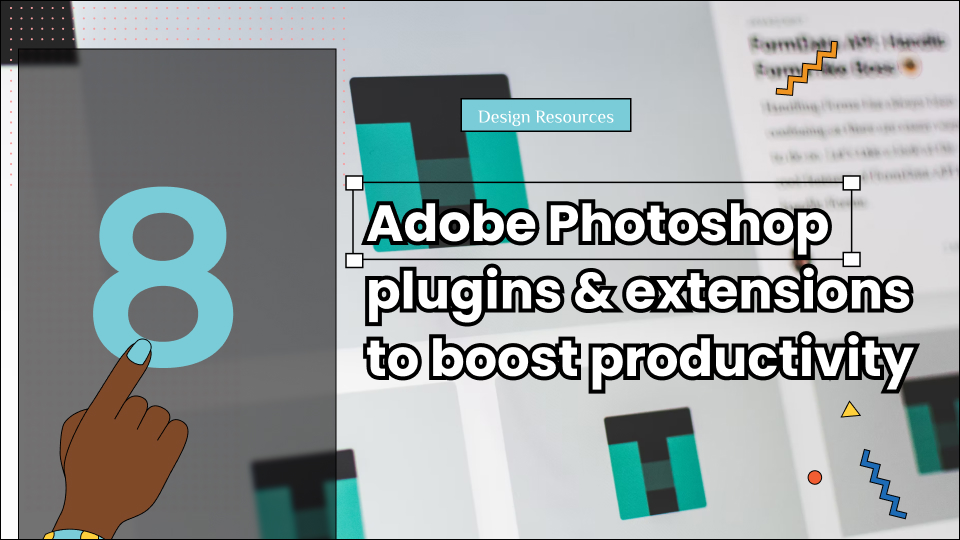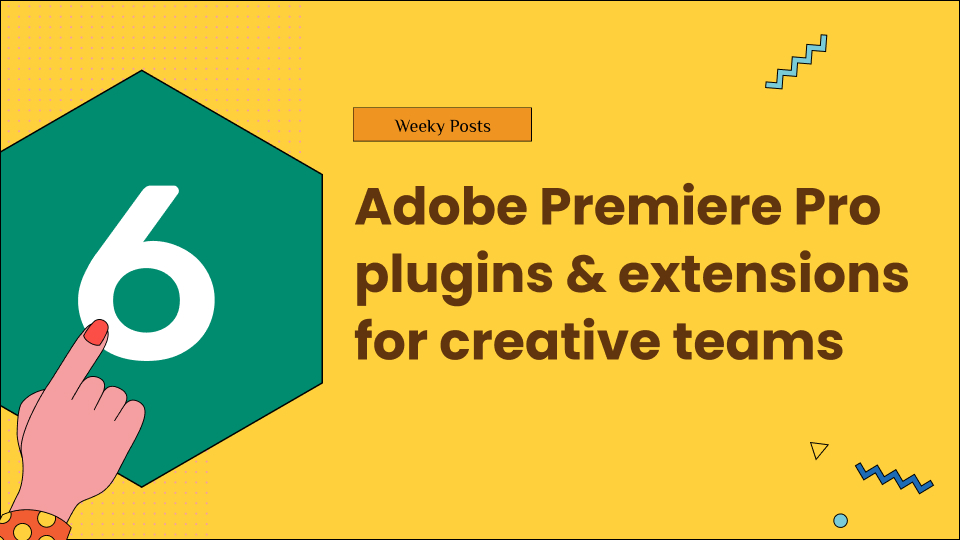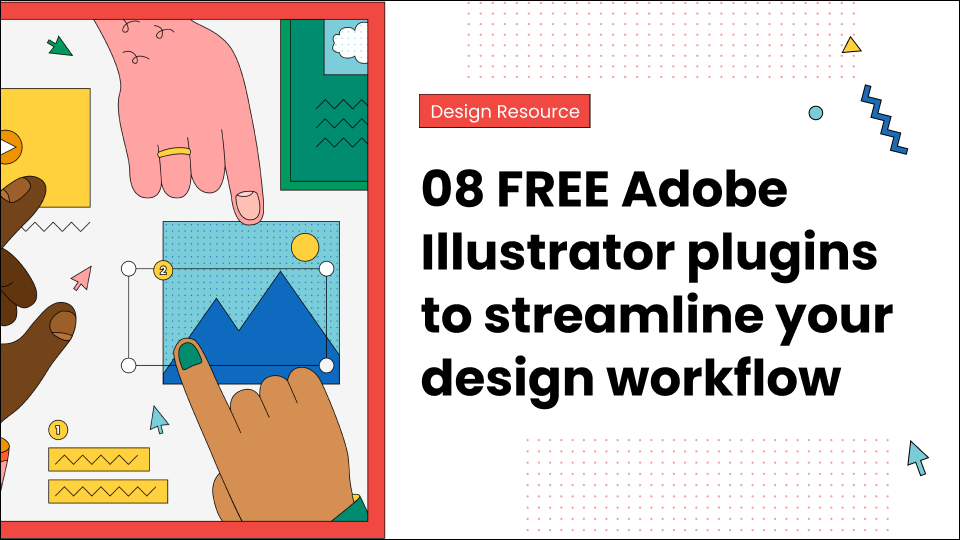Label compliance can be a tough nut to crack.
Compliance regulations vary by the country you sell in, and it’s hard to keep up with the constant changes.
Data says that there were around 220 lawsuits filed against F&B (Food & Beverage) companies for label non-compliance in 2020, up several times from a few years ago.
The review and approval process for product label claims is also inefficient and involves different departments and governing bodies.
Naturally, you’d want an easy way out to ensure 100% label compliance.
What if we tell you AI is the answer?
AI is leaving an impact on every sphere of business life, and label compliance is no exception. Read on to learn how AI can be used to help with label compliance, helping you avoid the traps of costly litigation.
Table of Contents
What is label compliance?
Label compliance is a process that ensures the labels and packaging of goods meet the rules and regulations of the country they’re sold. While all goods and their packaging must follow guidelines, the F&B, cosmetics, and pharma industries have stricter and more comprehensive regulations for label compliance.
The purpose of label compliance is to ensure consumer safety, help people make better purchase decisions, and bring transparency into a product’s behind-the-scenes moments.
Some of the organizations that oversee label compliance include:
- The Food and Drug Administration (FDA) in the United States
- Food Standards Agency (FSA) in the UK
- The European Food Safety Authority (EFSA) in the European Union
Label compliance regulations are constantly updated and are in a state of flux. These updates are impacted by political and governance changes as well as shifts in consumer behavior.
According to Foodnavigator, label compliance may get more turbulent in the UK in 2024 due to political changes, while new EU regulations for wine and wine products were only recently announced.
Recently, the FDA also revised guidelines for the F & B industry; read here to know all the important updates in the guidelines.
Let’s see how AI can help navigate the complex territory of constantly changing label regulations.
AI for label compliance
From identifying issues with packaging to checking how your label compares against the latest regulations, AI can help save human effort, time, and money.
Even better, it can identify issues the human eye can miss.
AI tools for label compliance use a mix of technologies, like
- Natural Language Processing (NLP) to read, interpret, and analyze label data
- Computer vision to read and identify packaging labels
- Optical Character Recognition (OCR) to digitize text from images for analysis
- Machine learning algorithms to ensure your labels are 100% compliant
Benefits of using AI for label compliance
Here’s a breakdown of using AI for label compliance:
Increased accuracy and efficiency
AI systems reduce error rates in label compliance by a significant margin compared to manual processes. A study from Micromachines found that AI-driven label verification systems achieved 99.7% accuracy, compared to around 90% for human reviewers. This alone translates to processing times that are 5 to 10 times faster than traditional methods.
AI systems process and analyze vast amounts of data with a high degree of precision to reduce errors in compliance checking. Plus, AI dramatically reduces the time needed for compliance checks by rapidly scanning and verifying labels against regulatory requirements.
Cost reduction
Implementing AI for label compliance leads to major cost savings. A report by Deloitte found that companies that adopted AI for regulatory compliance reduced their operational costs by 20-30% on average.
For large consumer goods companies, this amounts to millions of dollars annually. Additionally, the reduction in labeling errors prevents costly recalls, which average $10 million per incident in the food industry, according to a study by the Food Marketing Institute.
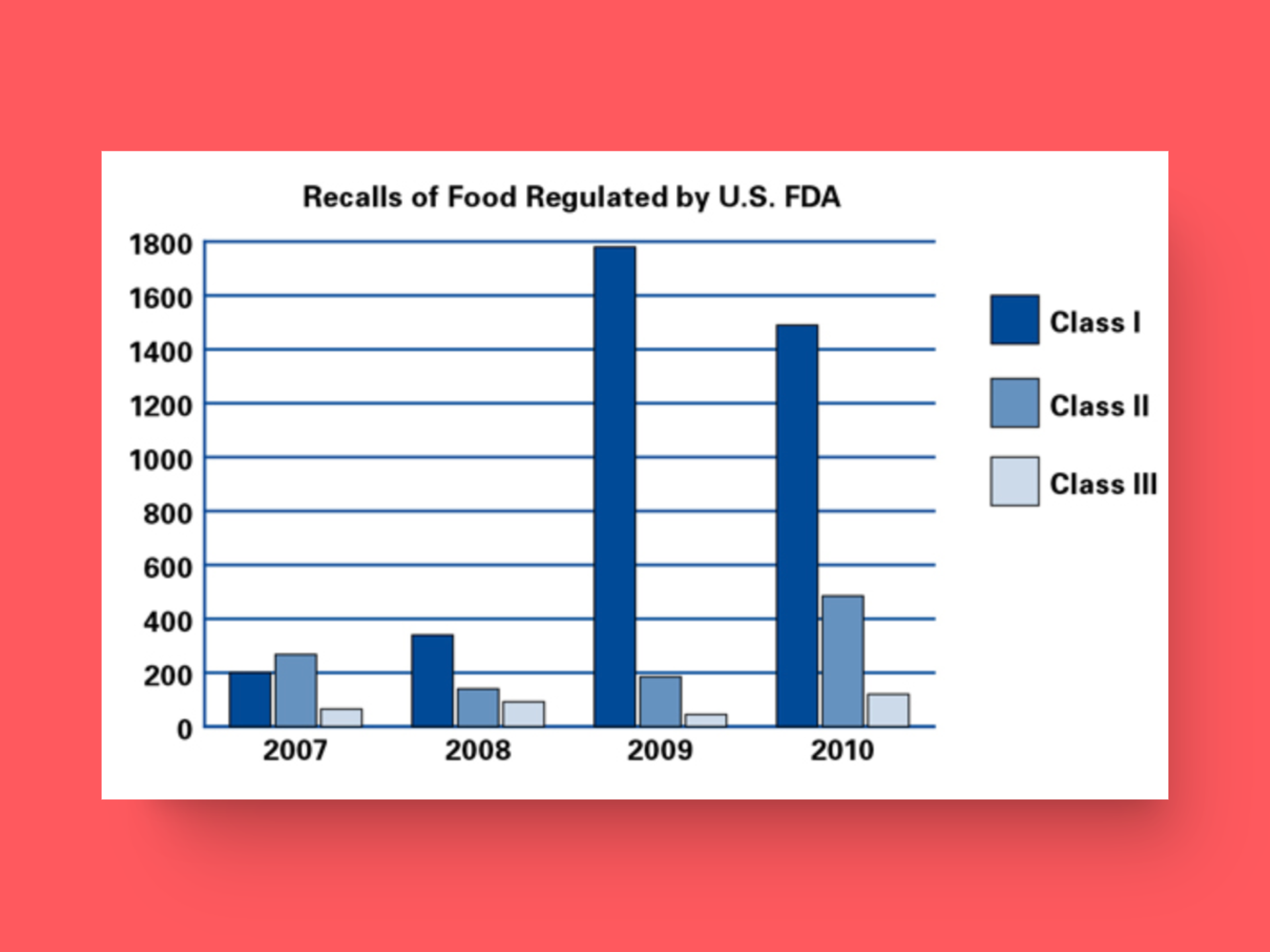
Integration with regulatory updates
Unlike traditional compliance databases, AI systems can be updated with new regulations in just a matter of hours. The same process would take weeks or months with manual processes. This rapid integration is very important as the FDA alone issues hundreds of guidance documents annually that affect product labeling, both directly and indirectly.
Although AI has only recently penetrated the compliance industry, 9 out of 10 early adopters reported noticeable improvements. Moreover, most AI systems easily fit into your existing Product Information Management (PIM) tech, which further streamlines the overall product development and launch process.
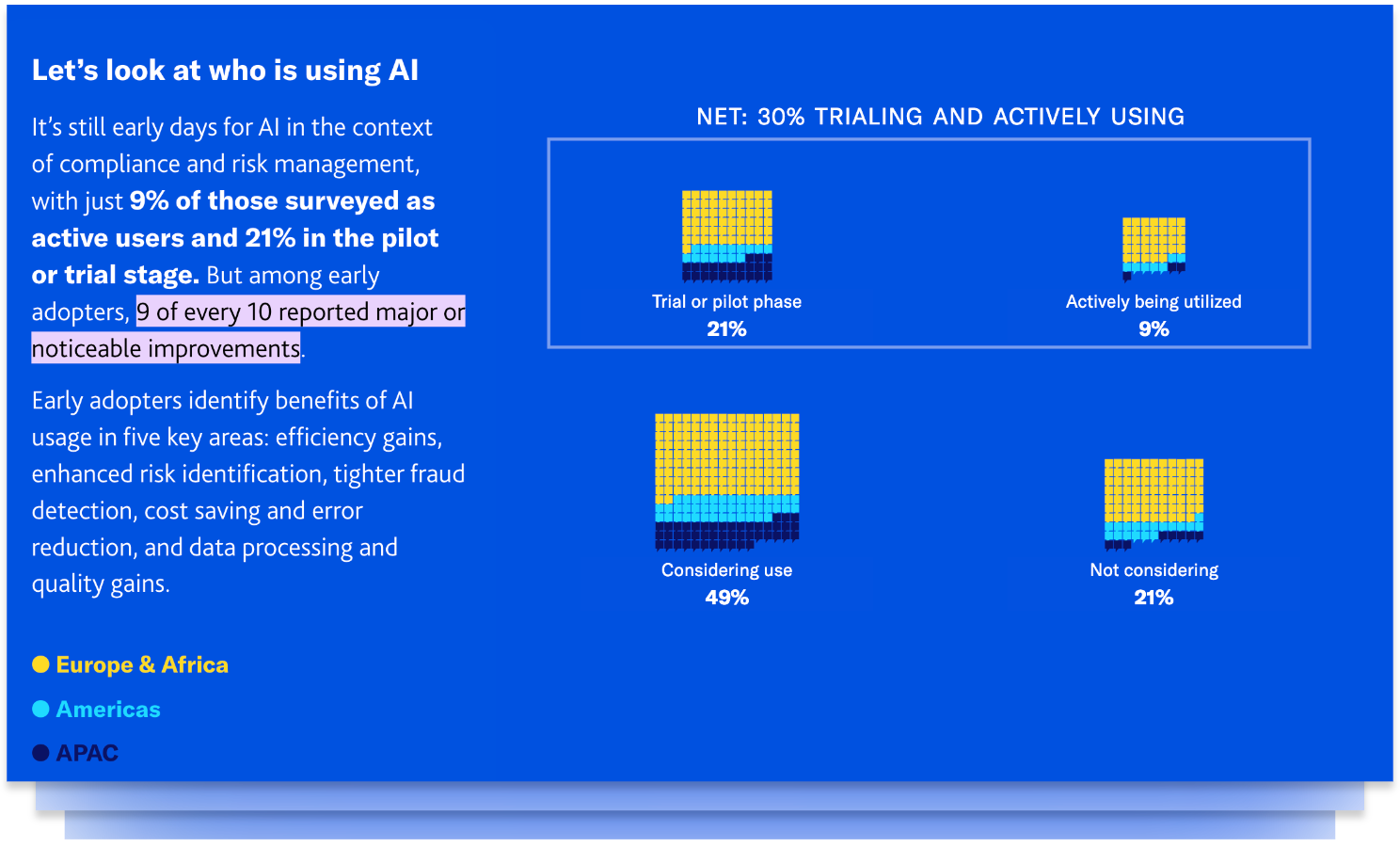
Scalability and consistency
AI solutions are capable of handling exponential increases in product volumes without a similar increase in resources. The availability of virtually unlimited computing power and the decreasing costs of data storage had a key role in this transformative scaling of AI solutions.
A good example of this increased scalability is automated label checking. As AI systems automate the tedious and error-prone process of label checking, organizations are able to scale their operations without a proportional increase in manual labor. Users: You also benefit from the standardization and harmonization of label specifications and process parameters, which makes way for consistent results across different products and regions.
How AI is transforming the packaging and labeling industry: Insights and use cases
AI label compliance can help brands across industries stay compliant and avoid expensive lawsuits. Let’s look at why AI for label compliance is the need across industries, and how brands are already using it in their packaging and labeling processes.
AI for the beauty industry
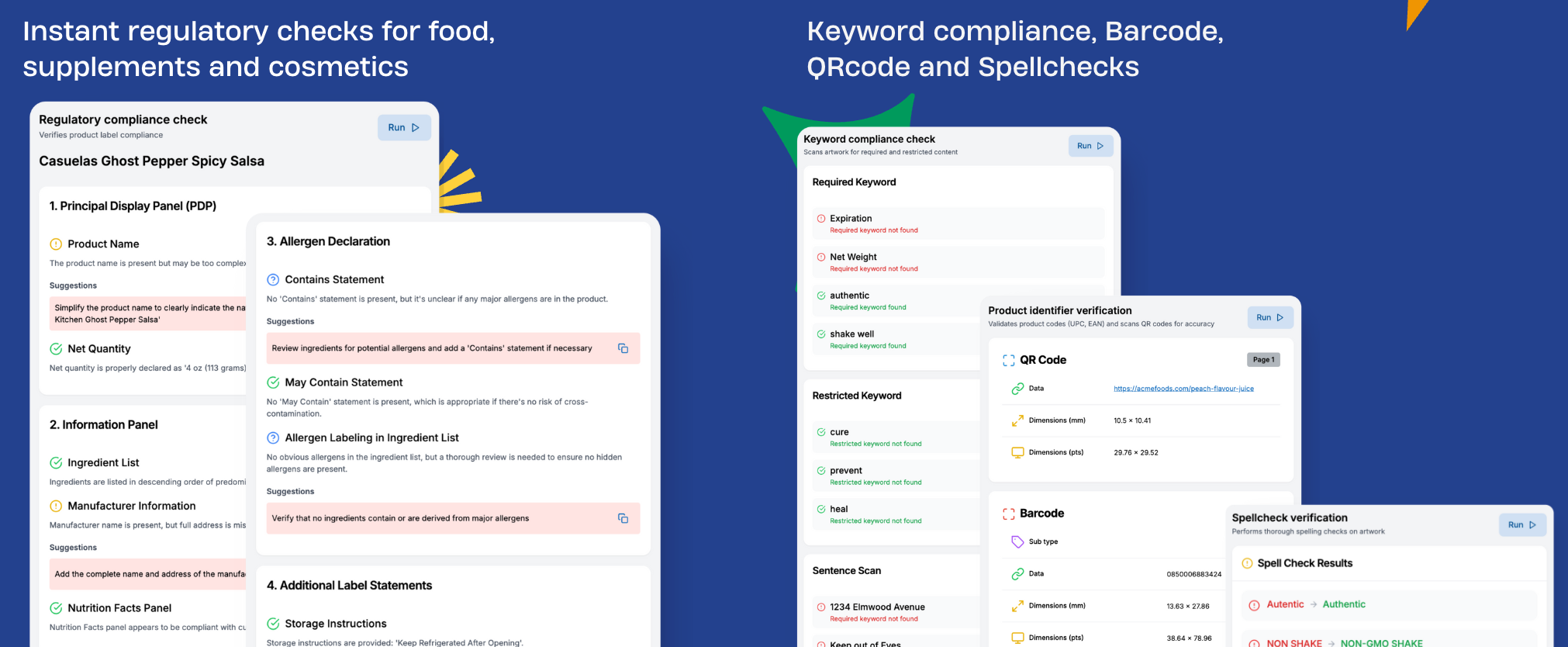
The Modernization of Cosmetics Regulation Act of 2022 (MoCRA) has recently come into effect and has propounded a whole new set of regulations for cosmetic products sold in the US. Apart from requiring a “Responsible Person” to register their products with the FDA and adverse effects reporting, MoCRA has mandated several new labeling requirements:
- By December 29, 2024, cosmetic labels must include a domestic address, phone number, or electronic contact (e.g., website) for receiving adverse event reports.
- Starting December 29, 2023, cosmetic products intended exclusively for professional use must be labeled accordingly.
- Cosmetic product labels must also disclose any fragrance allergens present in the product.
While small businesses are immune to MoCRA, there’s still a pressing need for action. Using AI-powered compliance tools like GoVisually’s AI Compliance for your wide range of products can help identify if your labels are compliant with laws like MoCRA.
GoVisually’s Compliance AI can conduct instant regulatory checks to conduct compliance for keywords (both restricted & required), QR codes, barcodes, spell checks, and more in just one click. You can easily go from spending weeks to minutes on each label and cut down 90% of the overall label compliance process.
AI is already helping redefine beauty product packaging by helping improve design while keeping focus on compliance. Beauty giants like L’Oreal are already leveraging AI to drive innovation and generate at least some ideas for product packaging, as are smaller, less-known brands.
AI for Food and Beverage (F&B)
The consequences of incorrect labeling in the F & B industry can even be fatal for consumers and detrimental to brands. For instance, the tragic case of Orla Baxendale, who died after eating a mislabeled cookie, caused severe damage to the brand’s reputation and lawsuit.
That’s why AI is critical to meeting the set of complex regulations in the F&B space. From checking the list of complete ingredients to identifying green claims, AI helps create better packaging and ensures labels comply with all regulations.
You can use AI technology to ensure all nutrients are mentioned, no ingredient is missed out on, and allergen information is clearly mentioned. AI vision also checks if ‘Directions For Usage’ and ‘Safety Information” are clearly inscribed. The consequences of incorrect labeling in the F & B industry can even be fatal for consumers and detrimental to brands.
Leaving the US and EU aside, South Korea, China, and recently even Thailand and Vietnam announced new stricter regulations for F&B packaging. Moreover, since 2021, major brands like Kellogg Co. and The J.M. Smucker Co. have faced class action lawsuits in the San Francisco federal court over protein content labeling.
Correct label information translates not just into defense against such hassles but also works to build consumer trust and meet FDA F&B guidelines.
AI for pharma industry
Research from Science Direct shows that incorrect drug labeling is a critical issue that can lead to severe health complications for patients. Labeling errors, particularly with high-risk medications, can result in permanent disability or even death in critical care settings. The same research notes that drug labeling issues are responsible for up to 30% of mortalities for medication errors.
Moreover, McKinsey estimates that pharma product recalls are extremely common and can happen as much as 20 times per week in the US alone. A major reason for recalls is packaging artwork errors.
This leads to lasting consequences: huge costs, lost lives, expensive and time-consuming litigations, and loss of brand image. Mislabelled packaging in the pharma industry is more than just being expensive; it can cause loss of lives and personal tragedies for families and friends.
That’s why companies should effectively deploy Compliance AI in this industry. It can automatically verify labels against established criteria, identify errors, and, most importantly, reduce the risk of human error and oversight during inspections.
Key features to look for in compliance AI software
You know that you need a robust AI tool for label compliance if you deal in products in one of the industries we mentioned above.
So, if you wish to invest in such a tool, here are some features to consider:
Keywords & scannable elements check
The software should be able to scan for and verify specific keywords and phrases that are either required or restricted in certain product categories. This includes checking for approved health claims, allergen statements, and mandatory warnings. Additionally, it should also thoroughly check all barcodes (UPC, QR codes, Code 128) on your labels to ensure they’re fully compliant and perfectly formatted. This feature ensures both textual and scannable elements meet regulatory standards and brand guidelines, reducing the risk of non-compliance and enhancing product traceability and consumer interaction.
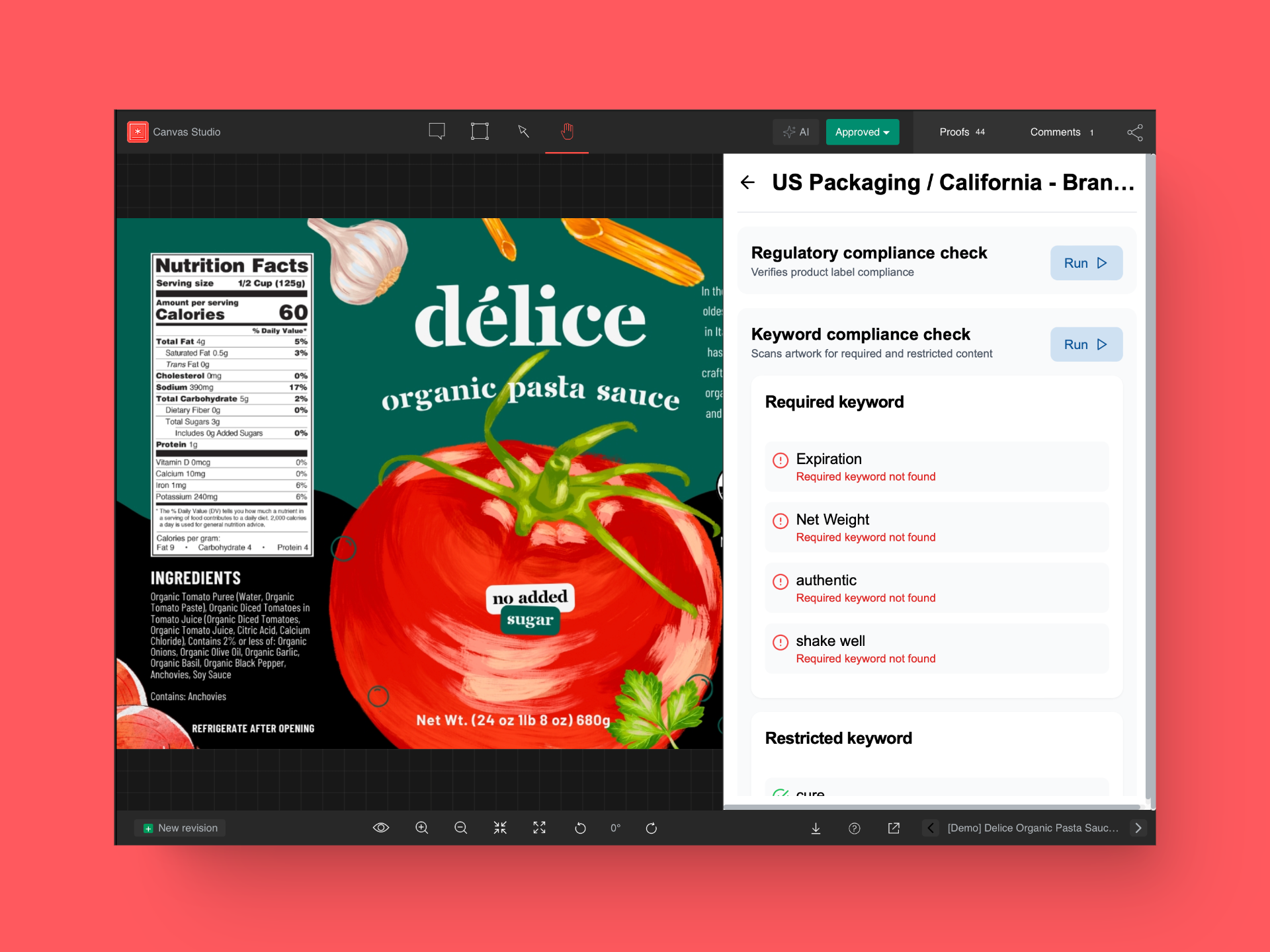
Customizable playbooks
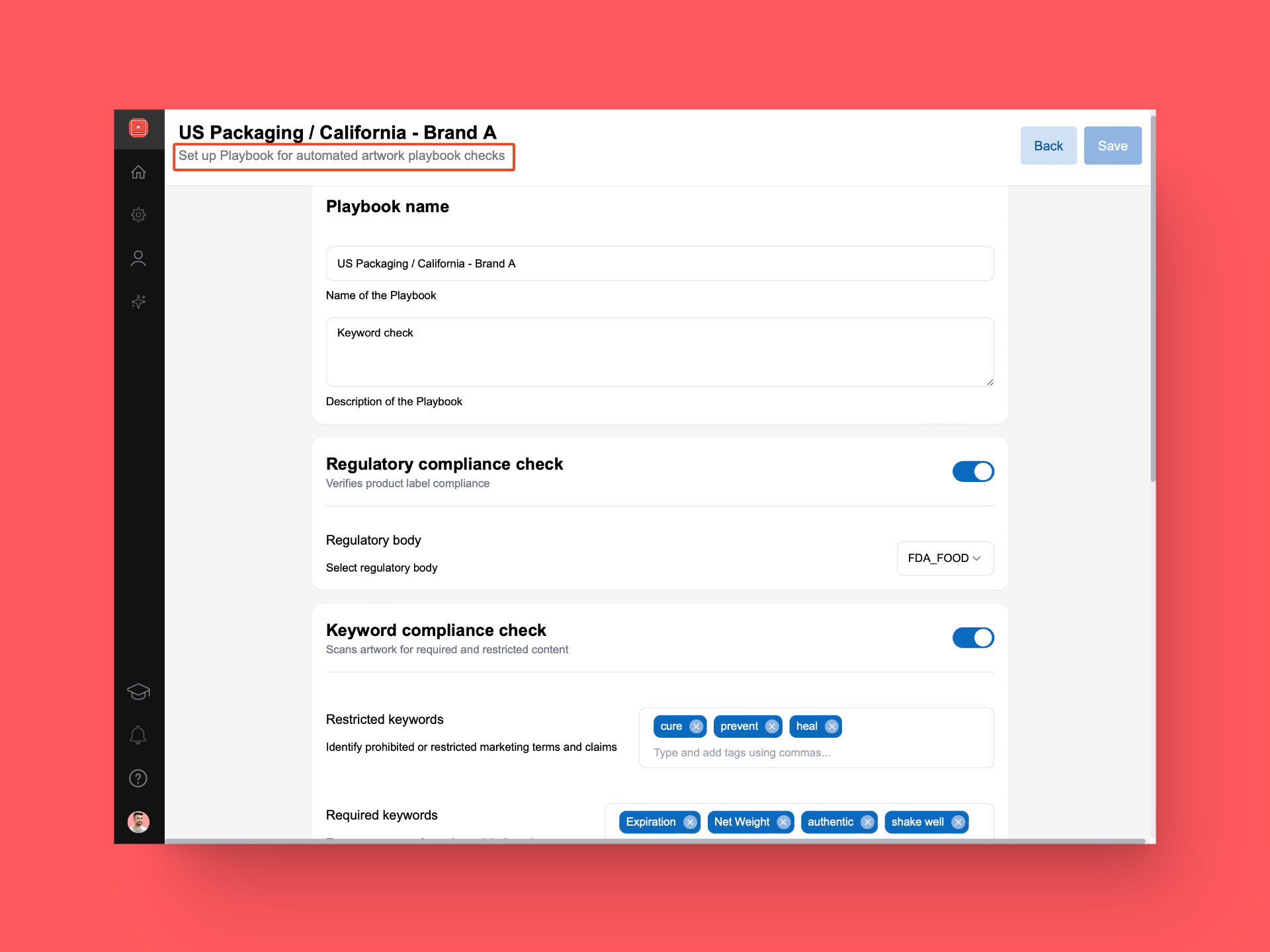
Go for software that’s highly customizable and lets you create custom playbooks for different product assortments and different export regions or languages and regulatory bodies. This feature allows businesses to adapt compliance checks to their unique requirements, ensuring that the software grows with the company’s needs and can handle diverse product portfolios.
Version control
Version control feature helps in comparing different versions of labels, across multiple review cycles to opt out the best design throughout the process. This feature also provides accountability and helps in regulatory audits by keeping track of each change in the label. You can track and understand why each change was made and who approved it.
Advanced analytics
Compliance software should offer powerful, one-click analysis capabilities, rapidly scanning labels for regulatory compliance. Look for an AI that offers comprehensive checks covering your industry, including spell-check, keyword compliance, customizable playbooks, exact match verification, barcode/QR code checks, ingredient list analysis, nutritional information verification, and multi-lingual support. By combining these features, the software can reduce the review cycle from weeks to minutes while also providing highly accurate compliance.
Automatic flagging of potential issues
An advanced feature to look for is the automatic identification and flagging of potential compliance issues. This proactive approach allows teams to address problems early in the design process, reducing the risk of non-compliance and minimizing costly revisions.
ROI projection and savings Calculator
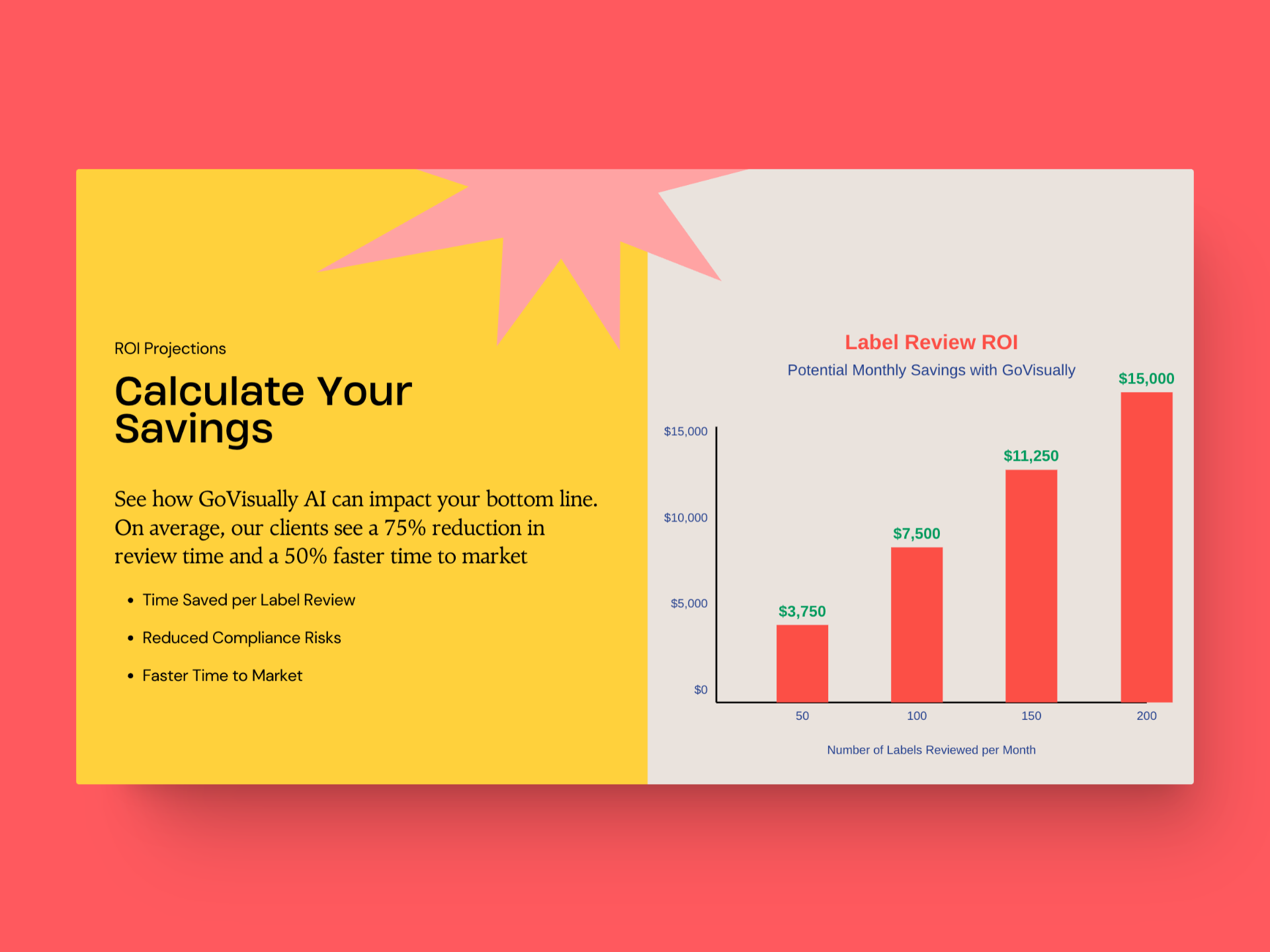
While not directly related to compliance checks, a valuable feature is the ability to project return on investment and calculate potential savings. This helps businesses quantify the benefits of implementing AI-powered compliance software, considering factors such as time saved per label review, reduced compliance risks, and faster time to market.
Integrations with existing workflows
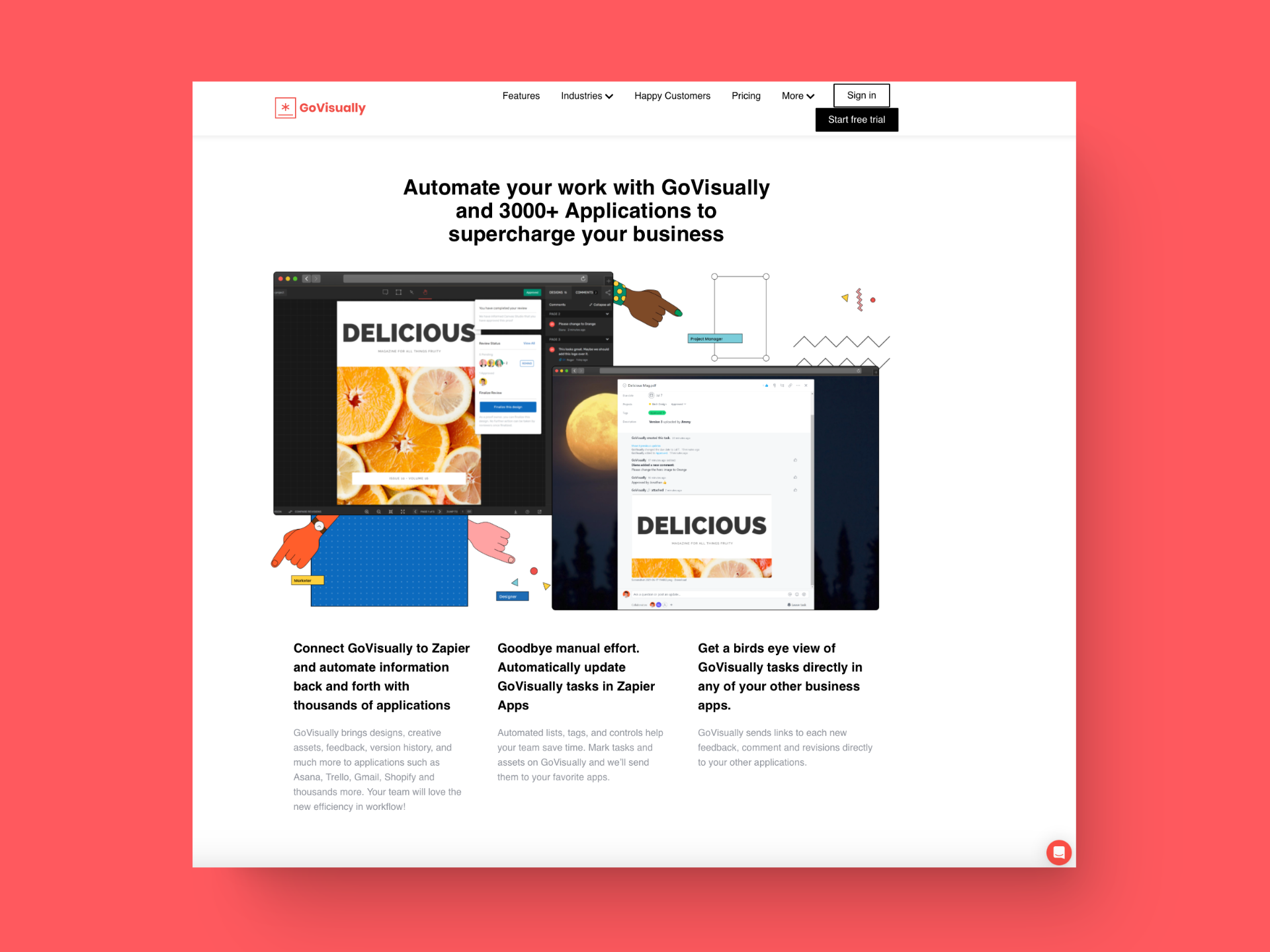
Advanced compliance software should seamlessly integrate with existing design and review processes, enhancing efficiency without disrupting established workflows. Look for solutions offering extensive integration capabilities, like GoVisually— it can connect with 3000+ apps (via Zapier) in just a single click. This allows for automated data transfer, real-time updates, and streamlined collaboration across teams.
Accelerate 50% Time To Market with GoVisually’s Compliance AI.
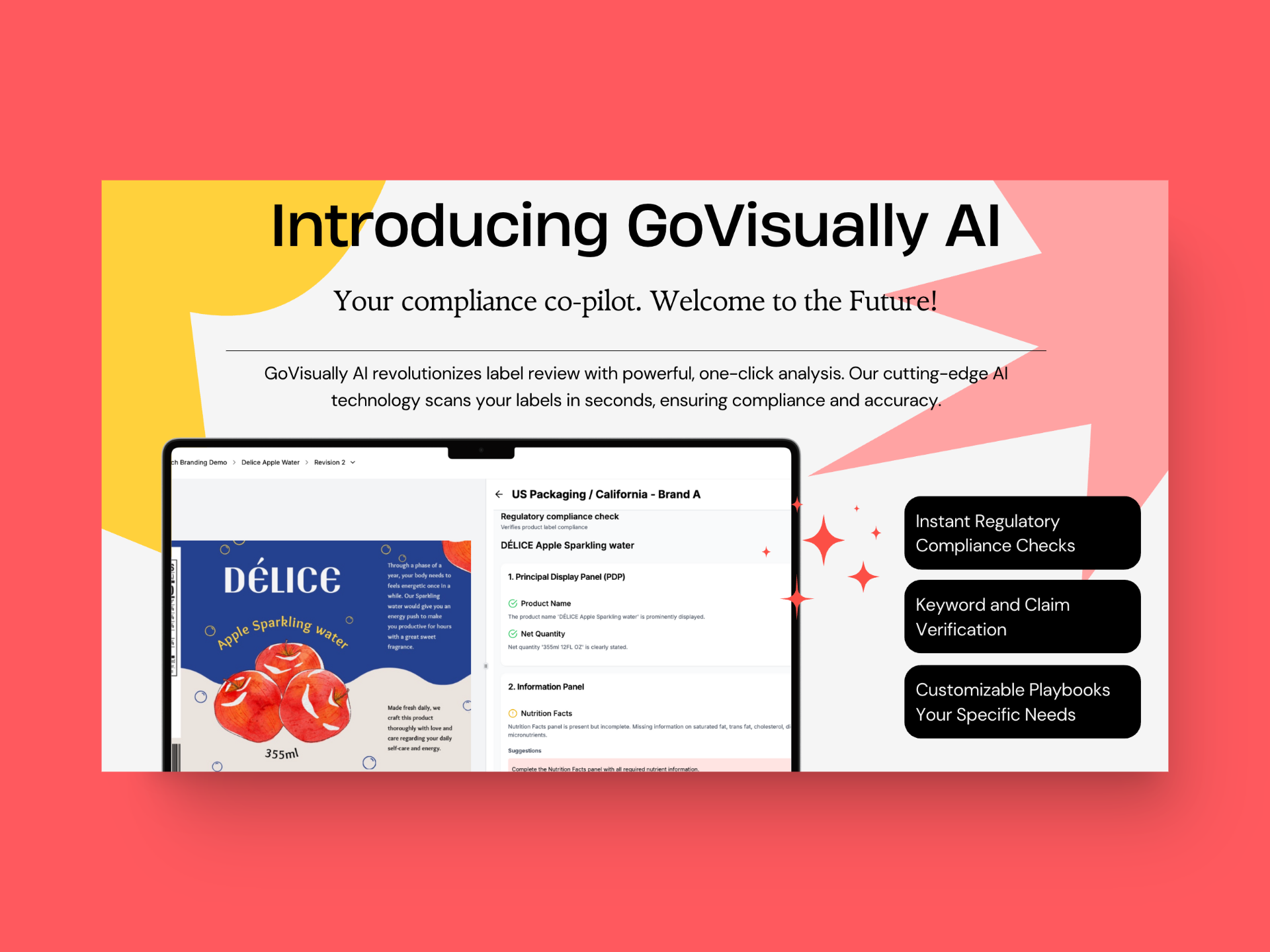
In a nutshell, Compliance AI can
- Reduce review time from 1-6 weeks per label to a few minutes
- Eliminate compliance risk
- Eliminate 1-2% human error into zero
- Achieve 90% faster process compared to manual checks
- Potentially save thousands of dollars per month in review costs
So, if you’re looking for AI Compliance software for your labels, we recommend using GoVisually. Our customers report that AI has reduced label compliance by up to 75% and accelerated time to market by 50%.
We have also launched a free Label Scorecard—a unique platform to see how well your labels comply with existing FDA standards. Simply upload your brand labels or paste a URL. Label Scorecard will generate a score between 1-100, assessing your label on various parameters, such as allergen info, nutrition list, storage instructions, and more.
